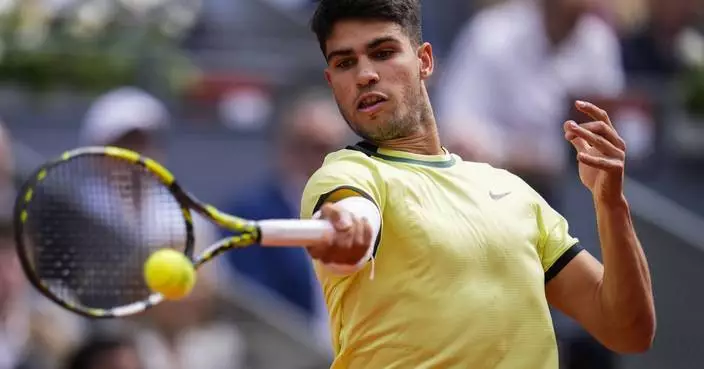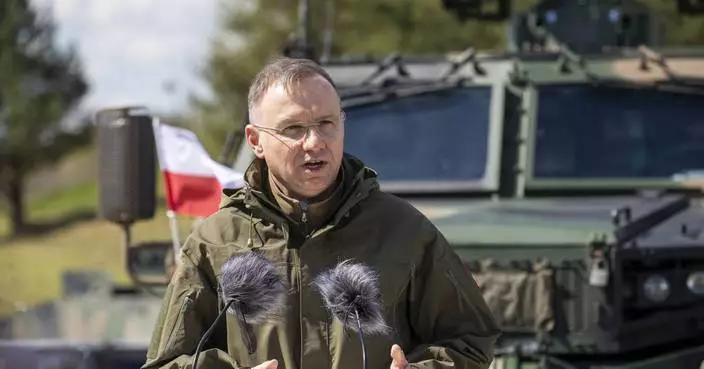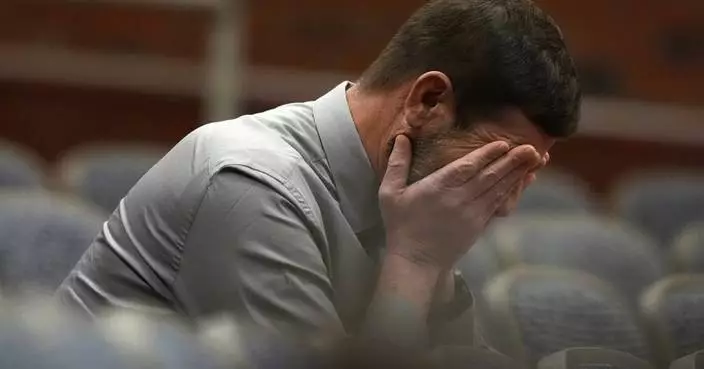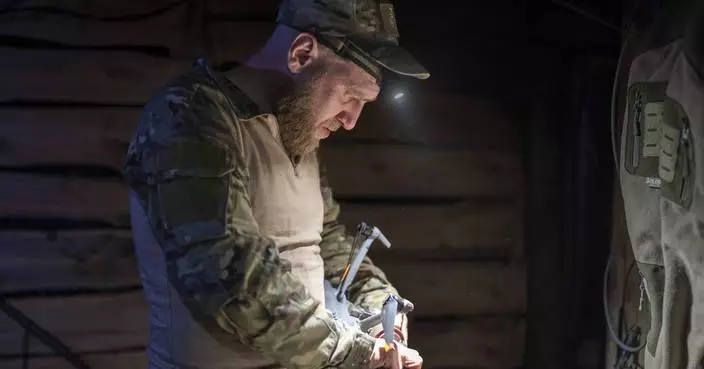North Korean leader Kim Jong Un complained of "U.S. hegemonism" to Russia's visiting foreign minister on Thursday, as one of his top lieutenants was in New York trying to pave the way for a summit with President Donald Trump.
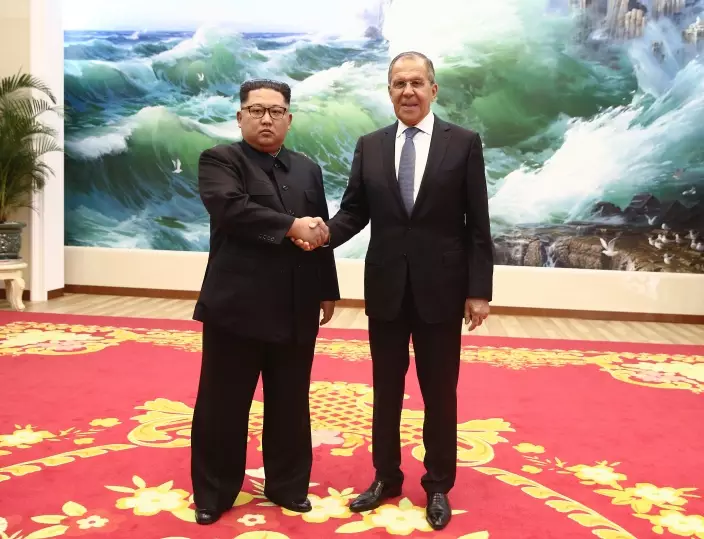
Korean leader Kim Jong Un, left, and Russia's Foreign Minister Sergei Lavrov pose for a photo during a meeting in Pyongyang, North Korea, Thursday, May 31, 2018 . (Valery Sharifulin/TASS News Agency Pool Photo via AP)
Kim told Sergey Lavrov that he hopes to boost cooperation with Russia, which has remained largely on the sidelines in recent months as Kim has reached out diplomatically to the United States as well as to South Korea and China.
Click to Gallery
North Korean leader Kim Jong Un complained of "U.S. hegemonism" to Russia's visiting foreign minister on Thursday, as one of his top lieutenants was in New York trying to pave the way for a summit with President Donald Trump.
Kim told Sergey Lavrov that he hopes to boost cooperation with Russia, which has remained largely on the sidelines in recent months as Kim has reached out diplomatically to the United States as well as to South Korea and China.
Kim Yong Chol, the highest-level North Korean official to visit the United States in 18 years, plans to travel to Washington to convey a personal letter by Kim Jong Un to Trump.
Despite having a border with North Korea and relatively cordial relations that President Vladimir Putin has seemed to want to develop further, Russia has kept a surprisingly low profile as Kim has emerged onto the world stage this year, meeting twice with Chinese President Xi Jinping and South Korean President Moon Jae-in.
"We welcome the contacts that have been developing in the recent months between North and South Korea, between North Korea and the United States," Lavrov said in comments to the media. "We welcome the summits that already took place between Pyongyang and Seoul as well as planned meetings between North Korean and U.S. leadership."
"As we move to adjust to the political situation in the face of U.S. hegemonism, I am willing to exchange detailed and in-depth opinions with your leadership and hope to do so moving forward," Kim told Lavrov.
Kim has previously made harsher comments and even threatened to launch nuclear attacks on the United States numerous times. But his comments Thursday come at a sensitive moment, when a senior North Korean official was in New York for talks with U.S. Secretary of State Mike Pompeo on the planned summit.
After his meeting with North Korean senior envoy Kim Yong Chol, Pompeo said "real progress" has been made in the last three days toward setting the conditions needed for Trump and Kim Jong Un to have a successful summit in Singapore. Still, Pompeo said he doesn't yet know whether the meeting will proceed on the announced date of June 12 and that he believes North Korea's leaders are contemplating a different path forward that would allow their nation to more fully integrate into the international community.
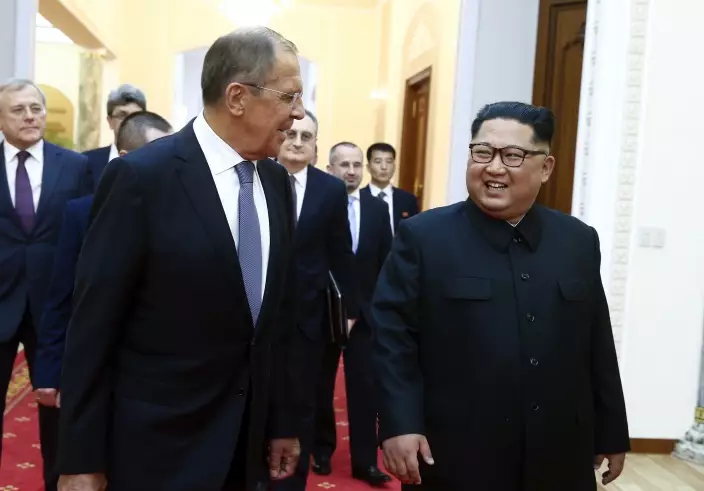
Korean leader Kim Jong Un, right, and Russia's Foreign Minister Sergei Lavrov talk to each other during a meeting in Pyongyang, North Korea, on Thursday, May 31, 2018 . (Valery Sharifulin/TASS News Agency Pool Photo via AP)
Kim Yong Chol, the highest-level North Korean official to visit the United States in 18 years, plans to travel to Washington to convey a personal letter by Kim Jong Un to Trump.
Kim Jong Un's comment on U.S. hegemonism wasn't carried by the North's official Korean Central News Agency, which targets an external audience. The agency quoted Kim as saying that the North's willingness for the "denuclearization of the Korean Peninsula still remains unchanged" but also that the process should be "stage-by-stage basis by founding a solution to meet the interests of each other."
Since January, Kim has significantly toned down his rhetoric against Washington and Seoul and tried to reach out to them following a year of heightened nuclear tensions that saw increased fears of war on the Korean Peninsula.
But continuing differences led Trump to abruptly cancel the planned summit last week, and then quickly announce it might still be held as scheduled.
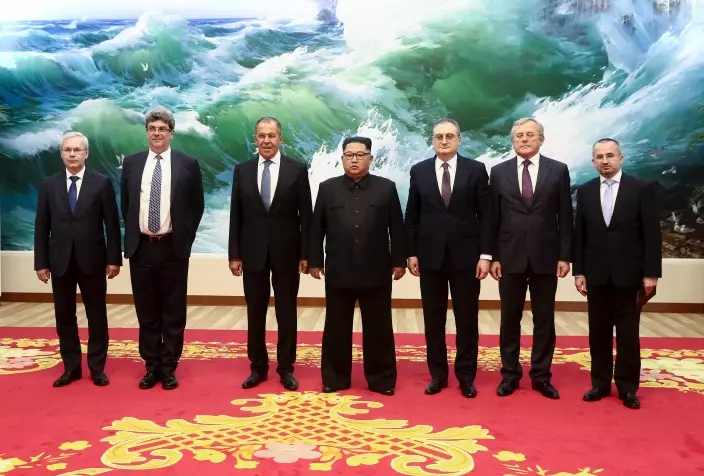
Korean leader Kim Jong Un, center, and Russia's Foreign Minister Sergei Lavrov, third left, pose for a photo with unidentified officials during a meeting in Pyongyang, North Korea, Thursday, May 31, 2018 . (Valery Sharifulin/TASS News Agency Pool Photo via AP)
Despite having a border with North Korea and relatively cordial relations that President Vladimir Putin has seemed to want to develop further, Russia has kept a surprisingly low profile as Kim has emerged onto the world stage this year, meeting twice with Chinese President Xi Jinping and South Korean President Moon Jae-in.
Lavrov's visit suggests Russia wants to become involved and make sure North Korea informs it of its intentions and is mindful of Moscow's concerns.
In their talks, Lavrov relayed Putin's "warmest regards and best wishes" for Kim's "big endeavors" on the Korean Peninsula. He also expressed Moscow's support for an agreement Kim reached with Moon at a summit last month that focused on measures to ease hostilities and increase exchanges between the two Koreas.
Video of the beginning of their meeting also showed Lavrov inviting Kim to Moscow.
According to Russian media, he also discussed ways to expand relations during a meeting with Foreign Minister Ri Yong Ho.
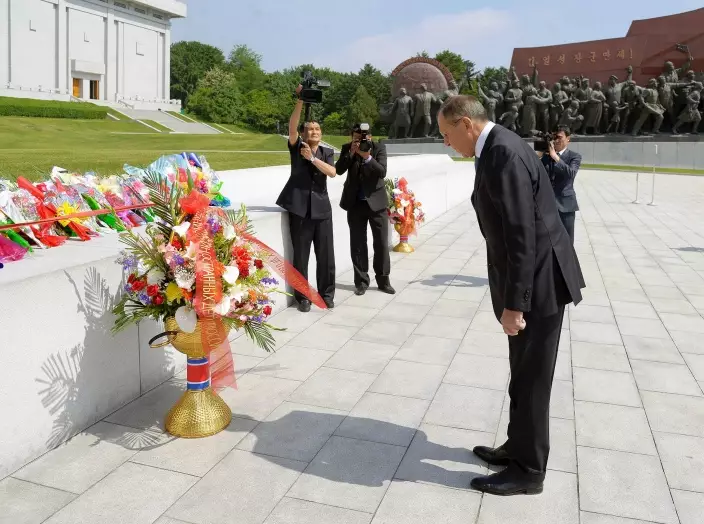
In this photo provided by the North Korean government, Russian Foreign Minister Sergey Lavrov bows after laying flowers at the statues of the late leaders Kim Il Sung and Kim Jong Il on Mansu Hill in Pyongyang, North Korea, Thursday, May 31, 2018. (Korean Central News Agency/Korea News Service via AP)
"We welcome the contacts that have been developing in the recent months between North and South Korea, between North Korea and the United States," Lavrov said in comments to the media. "We welcome the summits that already took place between Pyongyang and Seoul as well as planned meetings between North Korean and U.S. leadership."
He vowed Russia's support for denuclearization and a broader effort to create a stable and long-lasting peace in the region, but indicated that Moscow believes sanctions can be eased while the process is in progress, which diverges from the U.S. position that denuclearization must come first.
"It's absolutely obvious that when a conversation starts about solving the nuclear problem and other problems of the Korean Peninsula, we proceed from the fact that the decision can't be complete while sanctions are still in place," he said.
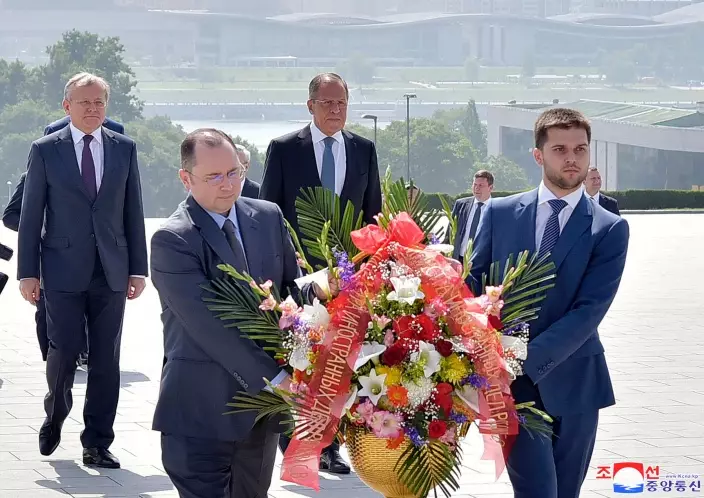
In this photo provided by the North Korean government, Russian Foreign Minister Sergey Lavrov, center rear, walks to lay a floral basket before the statues of the late leaders Kim Il Sung and Kim Jong Il on Mansu Hill in Pyongyang, North Korea, Thursday, May 31, 2018. (Korean Central News Agency/Korea News Service via AP)
WASHINGTON (AP) — The U.S. will provide Ukraine additional Patriot missiles for its air defense systems as part of a massive $6 billion additional aid package, Defense Secretary Lloyd Austin announced Friday.
The missiles will be used to replenish previously supplied Patriot systems. The package also includes more munitions for the National Advanced Surface-to-Air Missile Systems, or NASAMS, and additional gear to integrate Western air defense launchers, missiles and radars into Ukraine's existing weaponry, much of which still dates back to the Soviet era.
Ukrainian President Volodymyr Zelenskyy discussed the need for Patriots early Friday with the Ukraine Defense Contact Group, a coalition of about 50 countries gathering virtually in a Pentagon-led meeting. The meeting fell on the second anniversary of the group, which Austin said has “moved heaven and earth” since April 2022 to source millions of rounds of ammunition, rocket systems, armored vehicles and even jets to help Ukraine rebuff Russia's invasion.
Zelenskyy said at least seven Patriot systems are needed to protect Ukrainian cities. “We urgently need Patriot systems and missiles for them,” Zelenskyy said. “This is what can and should save lives right now.”
At a Pentagon press conference following the meeting, Austin said the U.S. was working with allies to resource additional Patriot systems but did not commit to sending more U.S. versions. He said he has been speaking one-on-one with a number of his European counterparts in recent days to hash out this issue and others.
“It's not just Patriots that they need, they need other types of systems and interceptors as well,” Austin said. “I would caution us all in terms of making Patriot the silver bullet.”
Austin said he is asking allied nations to “accept a little bit more risk” as they consider what weapons to send to Ukraine. A number of nations have expressed some reluctance to send Patriot air defense systems to Ukraine because most don’t have very many and they belieive they need them for their own defense.
U.S. officials said the aid package will be funded through the Ukraine Security Assistance Initiative, which pays for longer-term contracts with the defense industry and means that it could take many months or years for the weapons to arrive. The officials spoke on the condition of anonymity to discuss details not yet made public.
The new funding — the largest tranche of USAI aid sent to date — also includes High Mobility Artillery Rocket System, or HIMARS, as well as Switchblade and Puma drones, counter drone systems and artillery.
The Ukraine Defense Contact Group has been meeting about monthly for the past two years and is the primary forum for weapons contributions to Kyiv for the war.
Friday's meeting follows the White House decision earlier this week to approve the delivery of $1 billion in weapons and equipment to Ukraine. Those weapons include a variety of ammunition, such as air defense munitions and large amounts of artillery rounds that are much in demand by Ukrainian forces, as well as armored vehicles and other weapons.
That aid, however, will get to Ukraine quickly because it is being pulled off Pentagon shelves, including in warehouses in Europe.
Gen. CQ Brown, chairman of the Joint Chiefs of Staff, said the $1 billion weapons package will have a key benefit.
“There's some near-term effects,” said Brown, who stood alongside Austin at the Pentagon briefing. “Now the Ukrainians don't necessarily have to ration what they have because they know things are coming out of this package and there will be follow-on packages.”
The large back-to-back aid approvals are the result of a new infusion of about $61 billion in funding for Ukraine that was passed by Congress and signed into law by President Joe Biden on Wednesday. And they provide weapons Kyiv desperately needs to stall gains being made by Russian forces in the war.
Bitterly divided members of Congress deadlocked over the funding for months, forcing House Speaker Mike Johnson, a Louisiana Republican, to cobble together a bipartisan coalition to pass the bill. The $95 billion foreign aid package, which also included billions of dollars for Israel and Taiwan, passed the House on Saturday, and the Senate approved it Tuesday.
Senior U.S. officials have described dire battlefield conditions in Ukraine, as troops run low on munitions and Russian forces make gains.
Since Russia’s February 2022 invasion, the U.S. has sent more than $44 billion worth of weapons, maintenance, training and spare parts to Ukraine.
Among the weapons provided to Ukraine were Abrams M1A1 battle tanks. But Ukraine has now sidelined them in part because Russian drone warfare has made it too difficult for them to operate without detection or coming under attack, two U.S. military officials told The Associated Press.
Follow the AP's coverage of Russia's war in Ukraine at https://apnews.com/hub/russia-ukraine.
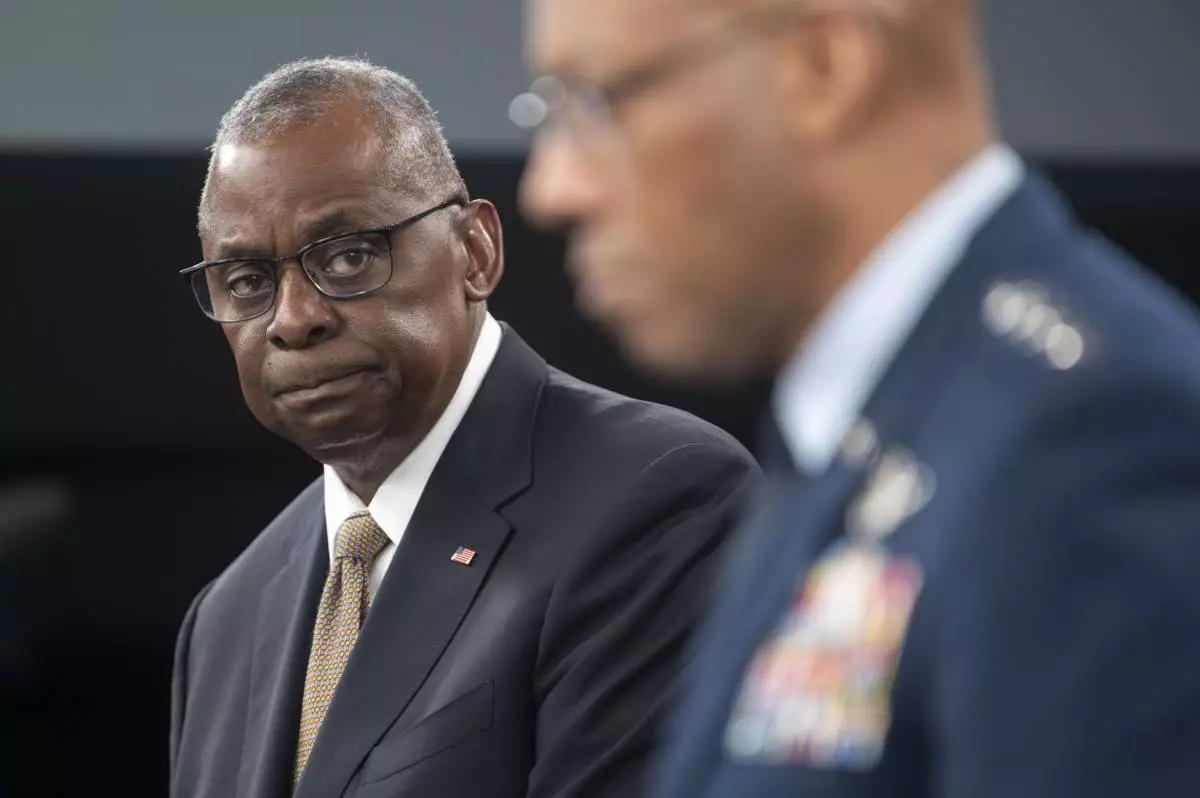
Defense Secretary Lloyd Austin, left, looks towards Chairman of the Joint Chiefs of Staff Gen. Charles Q. Brown Jr. during a press briefing on Friday, April 26, 2024 at the Pentagon in Washington. (AP Photo/Kevin Wolf)
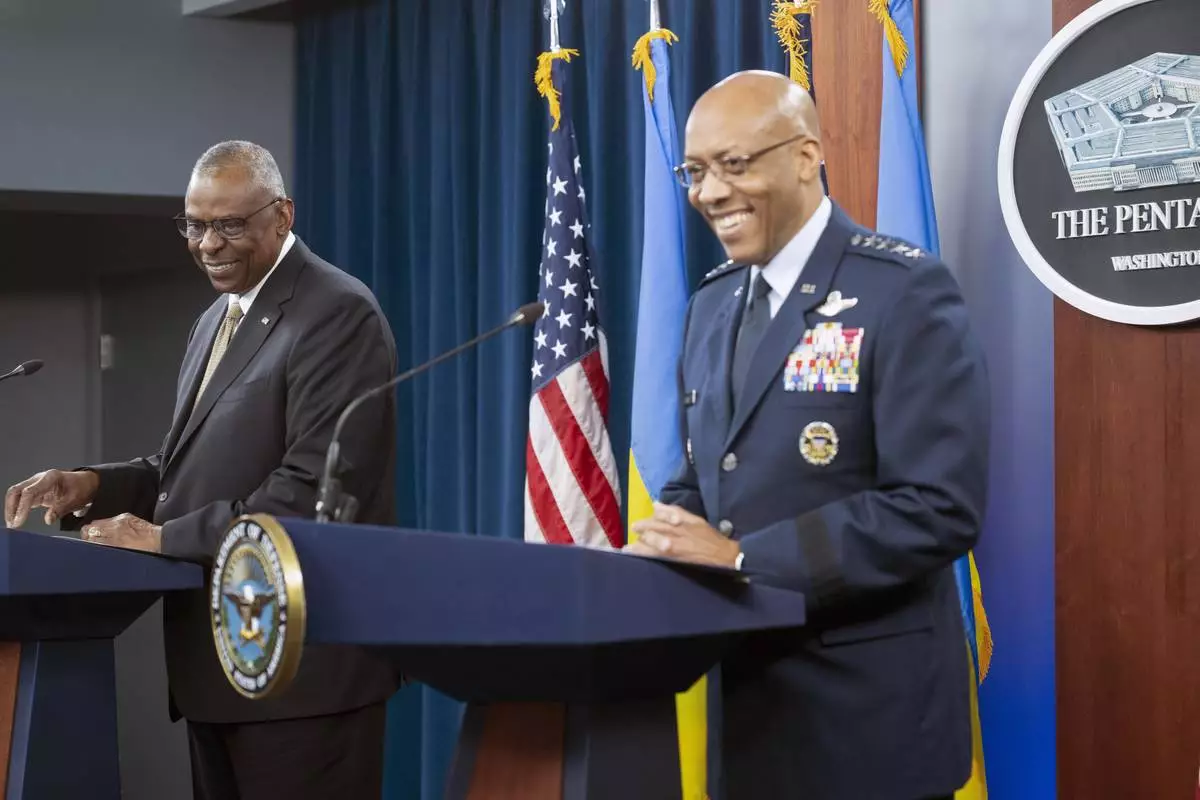
Defense Secretary Lloyd Austin, left, and Chairman of the Joint Chiefs of Staff Gen. CQ Brown Jr., share a laugh at the start of a press briefing on Friday, April 26, 2024 at the Pentagon in Washington. (AP Photo/Kevin Wolf)
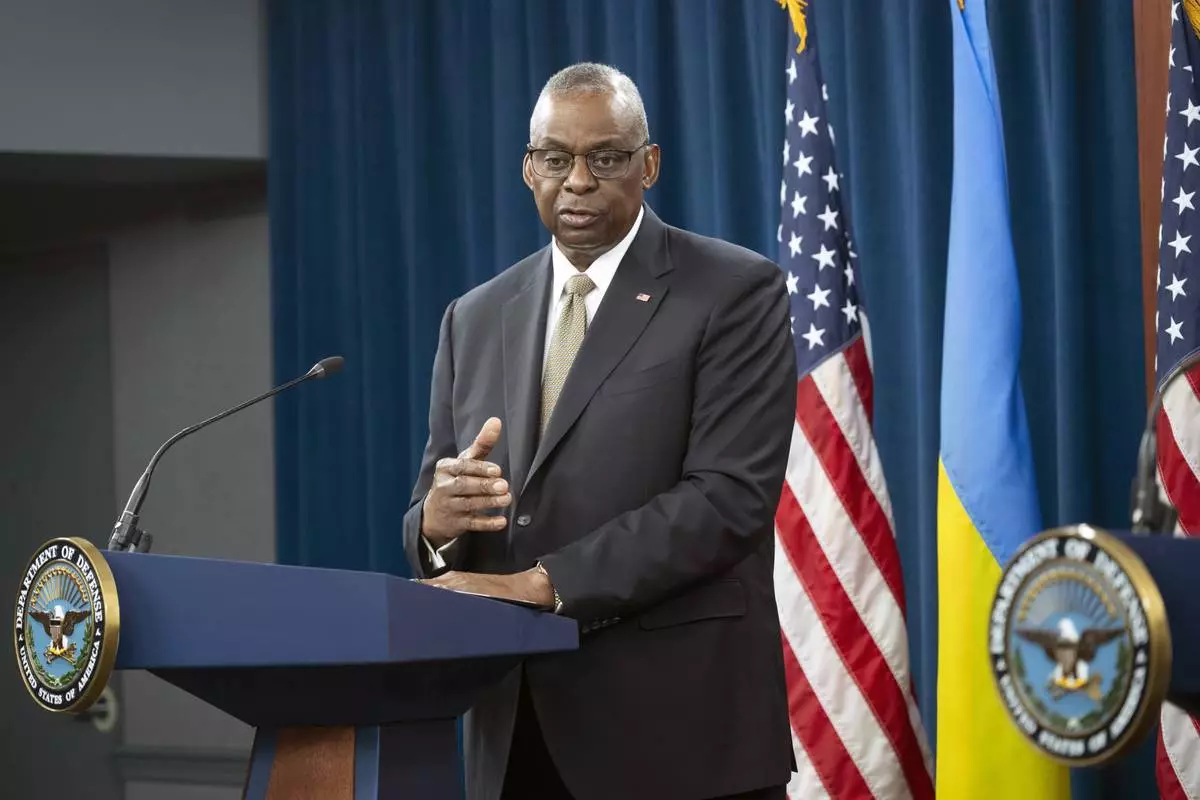
Defense Secretary Lloyd Austin speaks during a press briefing on Friday, April 26, 2024 at the Pentagon in Washington. (AP Photo/Kevin Wolf)
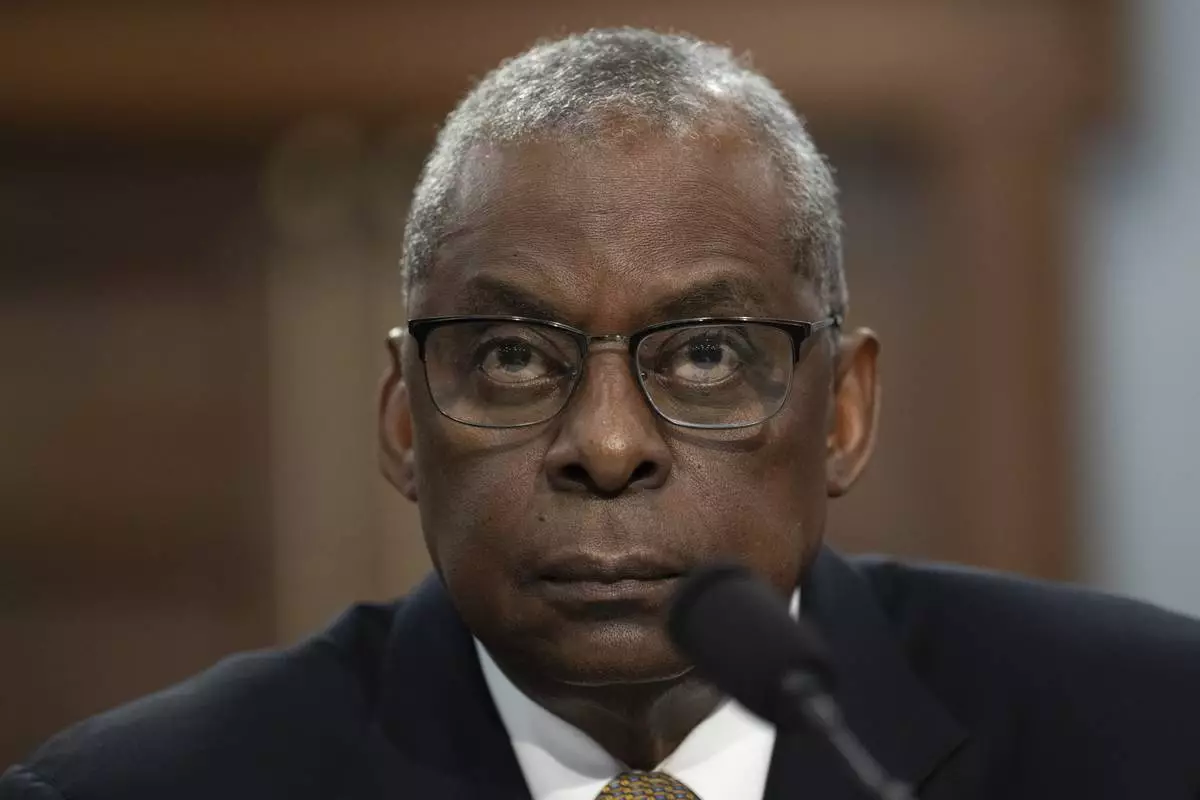
Sec of Defense Lloyd Austin during a House Committee on Appropriations, Subcommittee on Defense budget hearing Fiscal Year 2025 on Capitol Hill, Wednesday, April 17, 2024 in Washington. (AP Photo/John McDonnell)
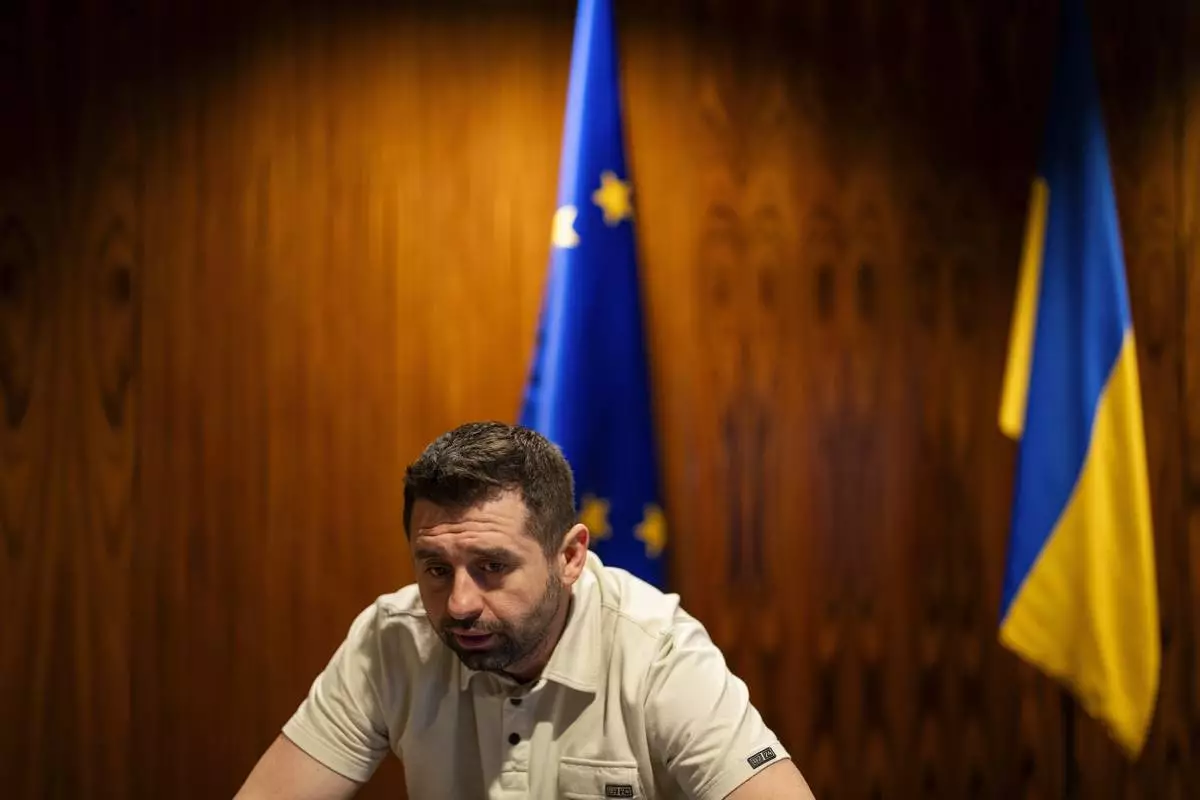
Davyd Arakhamia, a lawmaker with Ukrainian President Volodymyr Zelenskyy's Servant of the People party, talks during an interview with Associated Press in Kyiv, Ukraine, Monday, April 22, 2024. (AP Photo/Francisco Seco)
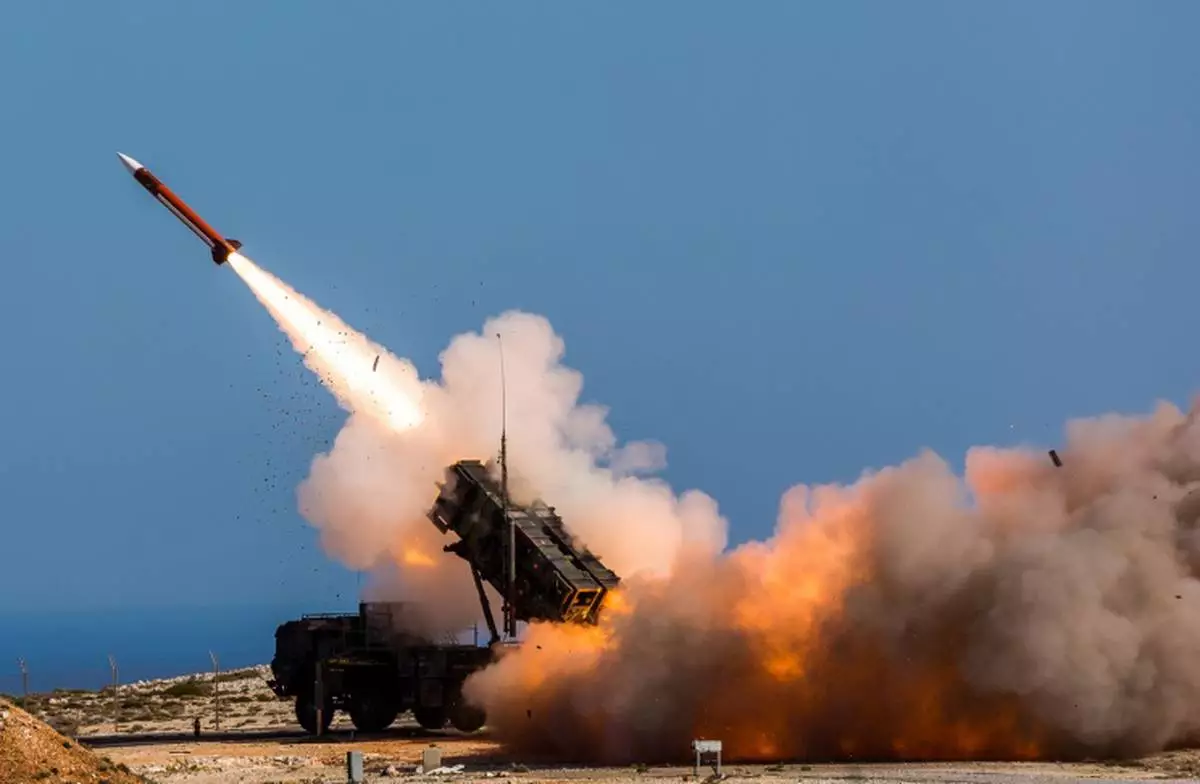
FILE - In this image released by the U.S. Department of Defense, German soldiers assigned to Surface Air and Missile Defense Wing 1, fire the Patriot weapons system at the NATO Missile Firing Installation, in Chania, Greece, on Nov. 8, 2017. U.S. officials say the Pentagon is expected to announce that it will provide about $6 billion in long-term military aid to Ukraine. It will include much sought after munitions for Patriot air defense systems and other weapons. (Sebastian Apel/U.S. Department of Defense, via AP, File)














